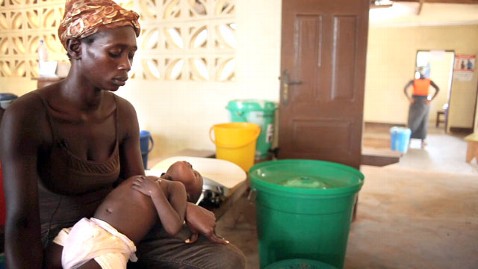New Hope: Major New Vaccine Initiative to Save Millions of Lives

Every 20 seconds, somewhere in the world, a child dies from a disease that could have been prevented with a routine vaccination.
Rotavirus, pneumonia, meningitis and other childhood illnesses claim the lives of 1.7 million children annually – almost all of them in developing countries. Countless other children survive, but suffer from stunting, malnourishment and other chronic illnesses.
Today, GAVI Alliance, a public-private partnership of the world’s main players in immunization, announced a $3.4 billion investment over the next four years in vaccinations against childhood diseases in 37 countries. Two dozen of the participating countries are in Africa.
“Our goal,” said GAVI CEO Dr. Seth Berkley, ” is to make sure that where a child is born doesn’t influence their right to have access to these modern miracles of medicine.”
Of the 37 countries who will participate in the program, about half plan to introduce pneumococcal vaccines, the other half will introduce rotavirus vaccines.
“We are targeting the two largest killers of children in the world,” said Berkley, at the GAVI announcement this morning, via a web conference for media.
Rotavirus alone kills more than 500,000 children a year and about half of those are from African countries. ”These vaccines will provide al lifeline for children across the African continent,” said Dr. John Wecker, director, vaccine access and delivery, PATH, an international non-profit dedicated to finding solutions to health problems.
Some of the countries participating in the GAVI program will also receive vaccinations for measles, meningitis A, and the pentavalent vaccine, which inoculates against five diseases simultaneously: iphtheria, tetanus, whooping cough, hepatitis B, and flu.
The vaccines will be supplied by Merck & Co. and GlaxoSmithKline at a deep discount.
The target cost of the vaccine preventing pneumonia, for example, will cost GAVI $3.50 at most. The same vaccine in the U.S. costs $90. Other pharmaceutical companies will be incentivized to participate in the supply chain as the program expands over the next four years
Prevention of these preventable diseases is crucial, experts say, since infections not only result in deaths, but they also ravage families, throwing economically marginal households into worse financial circumstances as their lives are disrupted attempting to care for their ill, procure treatment and medicine. At the same time, caring for the ill places a tremendous burden on already stressed medical systems in developing countries. Often they are unable to effectively treat the patients.
“If you immunize a child, it not only protects that child,” said Berkley. Preventing infection in some reduces the spread to many other children. “it’s something you do for the health of the public, not just for an individual.”
Before the introduction of a routine vaccine that included inoculation against rotavirus in the United States, the virus caused an estimated 20-60 deaths, more than 50,000 hospitalizations, as many as 205,000 emergency room visits, and 410,000 outpatient doctor visits per year, according to the Centers for Disease Control and Prevention.
GAVI, which is made up of the world’s main players in immunization – the World Health Organization, Unicef, World Bank, the Bill & Melinda Gates Foundation, the governments of donor and recipient countries, international development agencies, finance organizations and pharmaceutical companies, was created to enable vaccination of the 23.2 million children worldwide who go without lifesaving vaccinations against preventable diseases.
In Tanzania, during the rainy season, hospital beds in Dar-e-Salaam are packed three or more deep, with unvaccinated children, sick from the often deadly diarrhea and dehydration caused by the rotavirus.
Tanzania began preparing to receive vaccines through the GAVI program in advance of today’s announcement.
“They are impatiently awaiting the vaccine,” said Wecker.